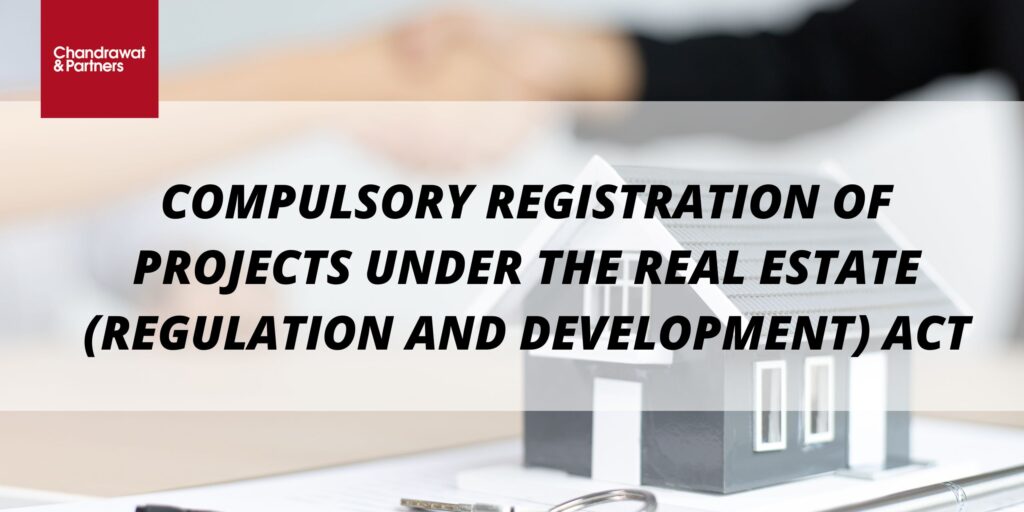Compulsory registration of projects under the Real Estate (Regulation and Development) Act
The Real Estate (Regulation and Development) Act, 2016, (RERA) seeks to protect the interests of home buyers and also boost investments in the real estate sector. The Real Estate (Regulation and Development) Act, 2016 (“the Act”), mandates all real estate projects related to commercial and residential property to be registered. Non-registration will result in penalties under the Real Estate (Regulation and Development) Act.
Compulsory registration
Section 3 clause (2) sub-clause (a) of the Act states, every real estate project (where the total area to be developed exceeds 500 sq mtrs or more than 8 apartments are proposed to be developed in any phase) must be registered with its respective state’s real estate regulatory authority. Existing projects where the completion certificate (CC) or occupancy certificate (OC) has not been issued are also required to comply with the registration requirements under the Act. While applying for registration, promoters are required to provide detailed information on the project, e.g. land status, details of the promoter, approvals, schedule of completion, etc. Only when registration is completed and other approvals (construction related) are in place, can the project be marketed.
Exemption from registration
The specified persons are exempted from the registration of the real estate project as follows:
- The area of land proposed for development does not exceed 500 square meters, and the number of apartments developed does not exceed eight apartments, including all the phases, which are exempted from registration.
- The promoter has received the completion certificate for a real estate project prior to the commencement of the Real Estate (Regulation and Development) Act.
- The real estate projects requested for remodelling, replacement, or development are those projects that do not require marketing, advertising, selling, or the new allotment of an apartment.
The real estate developers sometimes have been avoiding the registration of their projects on the above statutory condition that the number of apartments they are constructing are less than eight and for registration under the Act, both the conditions shall be met. Although some states have issued various guidelines with regard to the section.
Advantages of registration for buyers
- On-time possession of the property: The biggest loophole in the real estate sector has been fake promises by promoters of completion and delivery of projects, thereby causing huge financial worries and mistrust among the buyers. When promoters register under the RERA, they must provide the estimated date of completion of the project, failing which there will be huge penalties imposed on the promoter.
- Accurate details of the project: The promoter must provide complete and accurate details of the project, like the stage of completion, the amenities provided, and other relevant details of projects being executed, which cannot be altered later.
- Assured license clearances: Earlier, the promoters would never receive the mandatory licences and clearance from the government and would delay the projects on the pretext of the same. However, for promoters registered under RERA, it is mandatory to have the licences in place before selling even a single unit. Hence, the buyers cannot now be lured into fraudulent schemes.
- Repair of defects: It is the responsibility of the promoter to set right any defects or deficiencies post the purchase by the buyer.
- Restricted advertisement: The promoter can advertise their projects only after getting the required registration under the Real Estate (Regulation and Development) Act, and the registration number must also be displayed in the advertisement.
- Payment of the booking amount: The booking amount of 10% has to be paid only after the registration of the sale agreement.
Validity of Registration
The registration granted shall be valid for a period declared by the promoter for the completion of the real estate project or phase thereof as submitted in the affidavit along with the application for registration.
The registration granted by the real estate regulatory authority may be extended by it upon receipt of an application from the promoter in this regard under the following circumstances:
- Force Majeure: war, flood, drought, fire, cyclone, earthquake, or any other calamity caused by nature and affecting the regular development of the real estate project.
- Other than force majeure, the real estate regulatory authority may extend the registration to a maximum period of one year if it feels that the circumstances and reasons for extension are reasonable.
Impact of registration on real estate industry
There is a misconceived notion among buyers and even builders that a complaint can only be filed against a registered project. The law under its ambit is very specific, and it nowhere mentions a co-relation between both. Many RERA Authorities have even passed landmark judgments clarifying this point of law for buyers and builders that RERA Registration and complaint filling have nothing to do with each other. An aggrieved homebuyer can file the RERA complaints against any of the builder before the appropriate RERA Authority.
For more information or queries, please email us at
[email protected]





